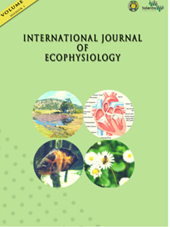A Detection of Gemini Virus on Tomato Plants (Solanum lycopersicum Mill.) in Karo North Sumatera Using Molecular Techniques
DOI:
https://doi.org/10.32734/ijoep.v6i2.17932Keywords:
Karo North Sumatera, Solanum lycopersicum Mill., Gemini virus, Polymerase Chain ReactionAbstract
Tomatoes are susceptible plants to various plant pests. One of the obstacles in tomato cultivation in Karo North Sumatera is the interference from various microorganisms such as plant virus attacks. The symptoms are the same as other diseases when in the field which causes difficulties in determining the type of virus that causes a disease, so it is necessary to carry out further testing as a good prevention. This study used the Polymorphism Chain Reaction (PCR) technique with universal primers for the Gemini virus. All samples of diseased tomato leaves originating from the Karo were attacked by Geminivirus which correlated with the presence of a DNA band measuring 1.5 kb after amplified.
Downloads
Published
Versions
- 2024-09-29 (2)
- 2024-09-27 (1)














